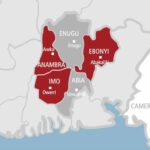
For the second time this year, the country is in the throes of a fuel crisis accompanied by unending queues, characteristic bedlam at fuel stations and mysterious arithmetic in which Premium Motor Spirit is sold at prices ranging from N170 to N300. The other time, it was contaminated fuel imported from Belgium (which took a whole month to subside); this time around, it is about elusive pricing and disputes between marketers and the authorities concerning at what price PMS should be sold. As usual, we have been told that it is a minor disruption but some experts are predicting that we are in for the long haul while queues choke life out of felicity in cities such as Lagos, Ibadan, Abuja and Port Harcourt.
Ideally, the global energy crisis ought not to have such a great impact on the economic and social well-being of an oil-producing country. But everybody knows the stories of import dependence, broken down refineries, rapacious cartels, mismanagement and bureaucratic corruption within the Nigerian National Petroleum Corporation, the sole importer of fuel. Ironically, as the crisis brewed, the President, Major General Muhammadu Buhari (retd.), in an interview with Bloomberg, accused the Western powers of double standards in that they subsidise fuel prices in their own countries on the one hand while on the other breathing down the neck of Nigeria to remove fuel subsidy. Good point but are we just knowing that? All the economic history books have told us that late industrialisers do not practice undiluted free market but a form of state capitalism with nationalist oars, which is how many of them managed to catch up with those on the frontline. This point should be qualified by the presence in our situation of racketeers in high places who turn economic nationalism into auspicious private theft, but that is a matter for another day.
Our misery in this respect is complicated by the unlovely reality that economic nationalism cannot be practised when the nation barely exists except as a concept and in academic jargon. This echoes Nobel Laureate, Wole Soyinka’s poignant question, “When is a nation?” For now, Nigerians are spending precious and quality time in fuel queues, scavenging for the increasingly scarce PMS priced out of the reach of many even when Buhari says that subsidy is not being removed.
Hopefully, and to put in a little bright spot, the much-awaited Dangote Refinery, all being well, will cushion the perennial breakdown in the fuel supply chain, although it will still raise queries about why it needs an entrepreneur to resolve a persistent and important riddle which the Nigerian state has abysmally failed to resolve.
That is not the only problem facing us. Two days ago, the Senate revealed that terrorists and bandits have virtually taken over several forests in parts of Kwara and Niger states. A more frightening version of that warning was issued recently by the Prelate of the Methodist Church Nigeria, His Eminence Samuel Uche, who spent a couple of weeks with terrorists who abducted him and freed him recently after a ransom payment on his behalf. In a post-event press conference, Uche is reported to have said that Fulani kidnappers claimed that they were already stationed in bushes in the South-South and South-West, including the vicinity of the Lagos-Ibadan expressway, waiting for a signal to strike (Dailypost, June 1, 2022). Of course, this could be mere boastfulness but, like a colleague illustrated recently, if someone threatens to blow off your head do you wait to find out whether all he has is a toy gun or actual weapons? In the same vein, a gang that successfully kidnapped a high-ranking religious leader, and held him hostage for weeks, had already displayed enough stamina and resources to outwit law enforcement. Therefore, it may be foolhardy to take its words as empty rhetoric.
Indeed, the subsequent massacre of worshippers at Saint Francis Church, Owo should be investigated as to what extent it is in direct confirmation of the threats of Uche’s abductors. This is a peculiar juncture in Nigerian history as evidenced by a similar revelation by Kaduna State Governor, Mallam Nasir El Rufai, that a classmate of his who was released from captivity recently testified that he overheard his abductors saying that the part of Kaduna State where they are hibernating is more pleasant and conducive to their work than the Sambisa forest where apparently they had hitherto dwelt. This nation is not very good at putting two and two together when it comes to existential security matters. However, it would be tragic if the government does nothing apart from promises and twitches until the country—or parts of it—is wiped off the map by insurgence and terrorism.
God forbid that this should happen; but are we reading the omens correctly? It remains to be seen whether the recent deployment of police contingents to the Kaduna-Abuja road by the Inspector-General of Police, Alkali Baba Usman, will avail or will merely end up like its forebears which failed to stem the haemorrhaging of lives. So whether we like it or not, Nigerians are in a desperate bind crying out for deliverance and escape. Nor is that all.
In spite of repeated promises, the electric power situation has gone from bad to worse, attended by serial breakdowns of the National Power Grid in the face of upward cascades in the unit price of electricity. Only recently, the Nigeria Labour Congress put it aptly when it said that Nigerians are paying for megawatts of darkness. It would have been nice to say that there is an end in sight but one is restricted from so declaring because of several unkept promises on the part of government, not only on this matter but in several others.
Other issues agitating many Nigerians include the ongoing strike by the Academic Staff Union of Universities, which has passed the 130-day benchmark, and cognate strikes by other unions in the universities amounting to paralysis of public higher education except in private universities. Without mentioning, the deadly inflationary spiral added to the misery, poverty and degradation in the land.
Is there an end in sight? The answer is blowing in the wind but for the sake of the much distressed and stranded humanity, the authorities should jerk themselves awake before too many people pass on out of hopelessness, despair or the pangs of hardship on a huge scale.





